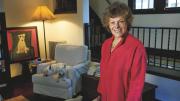Jerome Groopman, author and New Yorker writer (not to mention Recanati professor of medicine at Harvard Medical School), has written a book with his wife, assistant professor of medicine Pamela Hartzband, his most discerning critic (see “The Examined Life,” Harvard Magazine’s profile of Groopman), about patient attitudes toward doctors and medicine. The couple, whose book Your Medical Mind: How to Decide What is Right For You, was featured in the Boston Globe on October 3, say that patient beliefs are an important consideration when deciding how to treat an illness. They describe three dimensions of patient attitude, ranging from believer to doubter, maximalist to minimalist, and technologist to naturalist. Believers trust in medical solutions, while doubters focus on the fallibility of doctors and medical interventions; maximalists exhaust every avenue of treatment, while minimalists accept that medicine can't cure every ailment; technologists prefer the latest treatments, while naturalists seek homeopathic sorts of remedies. Groopman and Hartzband believe that the right treatment is different for each person and depends in part on the attitudes patients brings to their care.
“Patients who are comfortable with their treatment plans are more likely to follow their medication regimen and take good care of themselves,” the Globe reported the pair saying. “And they are less likely to have deep regrets if the treatment doesn't turn out as they'd hoped.”








